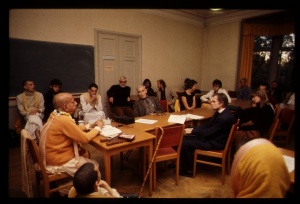SB 9.24.32: Difference between revisions
m (1 revision(s)) |
(Vanibot #0018 edit: make synonym terms in Sanskrit italic in SB - Vanisource) |
||
| Line 1: | Line 1: | ||
{{info | {{info | ||
|speaker= | |speaker=Śukadeva Gosvāmī | ||
|listener=King | |listener=King Parīkṣit | ||
}} | }} | ||
[[Category:Srimad-Bhagavatam - Canto 09 Chapter 24]] | |||
[[Category:Bhagavatam Verses Spoken by Sukadeva Gosvami - Vanisource|092432]] | |||
<div style="float:left">'''[[Srimad-Bhagavatam]] - [[SB 9|Ninth Canto]] - [[SB 9.24: Krsna the Supreme Personality of Godhead|SB 9.24: Kṛṣṇa the Supreme Personality of Godhead]]'''</div> | |||
<div style="float:right">[[File:Go-previous.png|link=SB 9.24.28-31]] '''[[SB 9.24.28-31]] - [[SB 9.24.33]]''' [[File:Go-next.png|link=SB 9.24.33]]</div> | |||
{{RandomImage}} | |||
==== TEXT 32 ==== | ==== TEXT 32 ==== | ||
<div | <div class="verse"> | ||
sāpa durvāsaso vidyāṁ | :sāpa durvāsaso vidyāṁ | ||
deva-hūtīṁ pratoṣitāt | :deva-hūtīṁ pratoṣitāt | ||
tasyā vīrya-parīkṣārtham | :tasyā vīrya-parīkṣārtham | ||
ājuhāva raviṁ śuciḥ | :ājuhāva raviṁ śuciḥ | ||
</div> | </div> | ||
| Line 17: | Line 22: | ||
==== SYNONYMS ==== | ==== SYNONYMS ==== | ||
<div | <div class="synonyms"> | ||
''sā''—she (Kuntī, or Pṛthā); ''āpa''—achieved; ''durvāsasaḥ''—from the great sage Durvāsā; ''vidyām''—mystic power; ''deva-hūtīm''—calling any demigod; ''pratoṣitāt''—who was satisfied; ''tasyāḥ''—with that (particular mystic power); ''vīrya''—potency; ''parīkṣa-artham''—just to examine; ''ājuhāva''—called for; ''ravim''—the sun-god; ''śuciḥ''—the pious (Pṛthā). | |||
</div> | </div> | ||
| Line 24: | Line 29: | ||
==== TRANSLATION ==== | ==== TRANSLATION ==== | ||
<div | <div class="translation"> | ||
Once when Durvāsā was a guest at the house of Pṛthā's father, Kunti, Pṛthā satisfied Durvāsā by rendering service. Therefore she received a mystic power by which she could call any demigod. To examine the potency of this mystic power, the pious Kuntī immediately called for the sun-god. | Once when Durvāsā was a guest at the house of Pṛthā's father, Kunti, Pṛthā satisfied Durvāsā by rendering service. Therefore she received a mystic power by which she could call any demigod. To examine the potency of this mystic power, the pious Kuntī immediately called for the sun-god. | ||
</div> | </div> | ||
__NOTOC__ | |||
<div style="float:right; clear:both;">[[File:Go-previous.png|link=SB 9.24.28-31]] '''[[SB 9.24.28-31]] - [[SB 9.24.33]]''' [[File:Go-next.png|link=SB 9.24.33]]</div> | |||
__NOTOC__ | |||
__NOEDITSECTION__ | |||
Revision as of 10:46, 1 December 2017

His Divine Grace
A.C. Bhaktivedanta Swami Prabhupada
A.C. Bhaktivedanta Swami Prabhupada
TEXT 32
- sāpa durvāsaso vidyāṁ
- deva-hūtīṁ pratoṣitāt
- tasyā vīrya-parīkṣārtham
- ājuhāva raviṁ śuciḥ
SYNONYMS
sā—she (Kuntī, or Pṛthā); āpa—achieved; durvāsasaḥ—from the great sage Durvāsā; vidyām—mystic power; deva-hūtīm—calling any demigod; pratoṣitāt—who was satisfied; tasyāḥ—with that (particular mystic power); vīrya—potency; parīkṣa-artham—just to examine; ājuhāva—called for; ravim—the sun-god; śuciḥ—the pious (Pṛthā).
TRANSLATION
Once when Durvāsā was a guest at the house of Pṛthā's father, Kunti, Pṛthā satisfied Durvāsā by rendering service. Therefore she received a mystic power by which she could call any demigod. To examine the potency of this mystic power, the pious Kuntī immediately called for the sun-god.